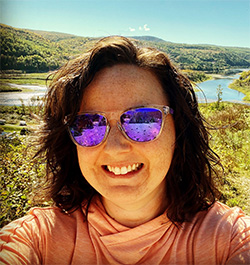Life sciences – a lifetime interest

By Johannie Martin, Project Manager, Quebec
As a native of the Gaspé Peninsula in Quebec, I knew from early childhood that I wanted to work in the scientific field. I dreamed of becoming a biologist, and I had fun recreating ecosystems and saving snails. Life sciences have always fascinated me, so when the time came to choose an academic path, biological sciences was an obvious choice for me.
I attended Université Laval in the magnificent Québec City, situated in the traditional territory of the Huron-Wendat people, where I acquired a bachelor’s degree in biochemistry, a master’s degree in biology and a Ph.D. in oceanography, and since December 2019, I have been working at the Impact Assessment Agency of Canada’s Quebec Regional Office as a Project Manager. My main responsibilities are to ensure the environmental assessment process runs smoothly and to provide recommendations to the Minister of Environment and Climate Change on the impacts of projects. To do this, the Project Manager, assisted by the Agency’s project team and the Government Expert Committee, analyzes the data submitted by the proponents and assesses the relevance of the proposed mitigation measures and monitoring and offset programs. The Project Manager deals with everything and addresses many subjects, ranging from species at risk to human health to impacts on heritage. The Project Managers also represents the Agency when dealing with proponents, the public and Indigenous communities.
Many of the skills I have acquired through my specialization in Arctic oceanography are still very useful to me, even though most of the projects I analyze are in Southern Canada and in terrestrial environments. The Project Manager is a generalist type of position, and because of the wide variety of fields in which we have to intervene, curiosity is essential. The scientific method is also an unavoidable necessity that will always be useful for solving complex problems, regardless of the field of practice.
I had to overcome certain obstacles to achieve a successful scientific career. When I entered the job market eight years ago, there was a severe job shortage in the life sciences field. Some of us had to work from contract to contract for several years, or work in other fields. Fortunately, the situation has improved since then. There are now great career opportunities available to biologists and other recently graduated environmental specialists. Considering the new environmental requirements and the growing professional recognition in life sciences, the future looks promising for those who want to make a career for themselves in this field.
I encourage girls and women to pursue a scientific education, because the science field offers exciting and future-oriented career opportunities allowing participation in major contemporary issues such as fighting climate change or pandemics. For example, the last project on which I worked had as main issues the project’s impact on the achievement of Canada’s greenhouse gas emission and climate change objectives and on the recovery of the St. Lawrence beluga, an endangered emblematic species of the St. Lawrence Estuary biodiversity. From my perspective, science is a diversified field that helps us better understand the world around us. Increasingly, jobs in science demand a multidisciplinary approach and favour encounters of competent and enthusiastic experts in varied fields. This cooperation and communication are what I love most about my career in science.
This is how I have progressed through the field of science as a woman. I hope my journey will inspire other girls and women to pursue a similar career.
Johannie Martin - Life sciences—a lifetime interest (Transcript)
The Impact Assessment Agency of Canada celebrates International Day of Women and Girls in Science.
What do you like most about working in science at the Agency?
Johannie Martin, Project Manager, Quebec.
"What do I like most about working in science? Well, I would say that science is an area that helps us better understand the world around us. Science allows us to play a role in major contemporary issues, such as the fight against pandemics or the fight against climate change, which we hear about almost every day. It also allows us to work with other scientists who are also passionate about their field, who are competent, so it gives us a better understanding of the full spectrum of issues. It also allows us to be in touch with the public, with First Nations people. Therefore, it helps us better understand how they see the projects and their concerns about the projects we assess and submit to the government.
"